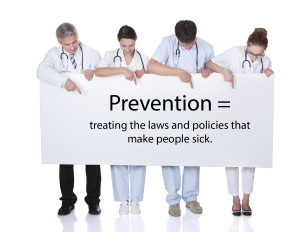The National Center for Medical-Legal Partnership was awarded a 3-year National Cooperative Agreement (NCA) from the U.S. Health Resources and Services Administration (HRSA) to cultivate and support medical-legal partnerships at community health centers across the country. The award comes with $300,000 in grant funds per year.
 Medical-legal partnerships (MLP) bring together civil legal aid agencies and law schools with healthcare institutions to integrate legal care into the delivery of healthcare and treat individuals’ health-harming social and legal needs related to housing, insurance, benefits and education. Legal and healthcare professionals at MLPs also work together to identify and improve policies and laws that affect community health. There are currently MLPs at 112 health centers across the United States, and an additional 119 partnerships at hospitals.
Medical-legal partnerships (MLP) bring together civil legal aid agencies and law schools with healthcare institutions to integrate legal care into the delivery of healthcare and treat individuals’ health-harming social and legal needs related to housing, insurance, benefits and education. Legal and healthcare professionals at MLPs also work together to identify and improve policies and laws that affect community health. There are currently MLPs at 112 health centers across the United States, and an additional 119 partnerships at hospitals.
“We know that unmet social needs have a significant impact on people’s health and well-being,” said Joel Teitelbaum, co-Principal Investigator of NCMLP. “This award recognizes that addressing these needs through civil legal aid as part of primary care can help build healthier communities.”
The three-year award from HRSA, a division of the U.S. Department of Health and Human Services, designates NCMLP as a technical assistance center for health centers. NCMLP will develop toolkits and provide trainings that help health centers develop and sustain medical-legal partnerships.
“Health centers and legal aid offices have been coordinating care for fifteen years,” said Ellen Lawton, co-Principal Investigator of NCMLP, “but this award signals an important recognition by the healthcare community of the role legal care can play in promoting and protecting health. We are grateful to HRSA for recognizing the important role medical-legal partnership can play in fulfilling the mission of health centers.”
National Cooperative Agreements provide national organizations grant funds to help federally qualified health centers and look-alike health centers meet program requirements and improve performance to provide better patient care. Grantees become technical assistance centers that support program development and conduct national analyses around vulnerable and underserved populations. Fifteen additional organizations were awarded NCAs:
- Association of Asian Pacific Community Health Organizations
- Association of Clinicians for the Underserved
- Capital Link
- Community Health Partners for Sustainability
- Corporation for Supportive Housing
- Farmworker Justice
- Health Outreach Partners
- MHP
- Migrant Clinicians Network
- National Association of Community Health Centers
- National Center for Farmworker Health
- National Center for Health in Public Housing
- National Health Care for the Homeless Council
- National LGBT Health Education Center
- School-Based Health Alliance
